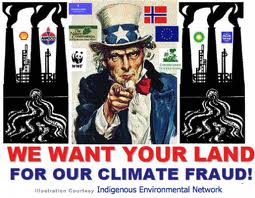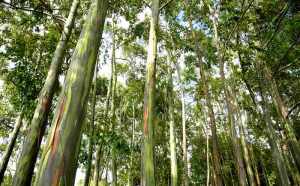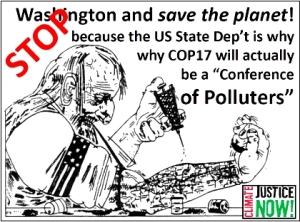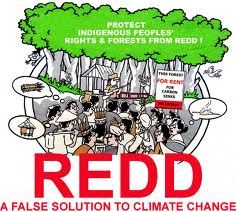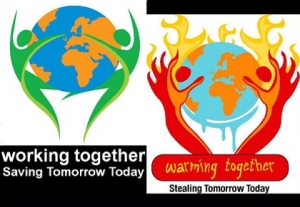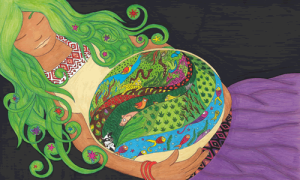 This panel was hosted by RIGAS, the Italian Network for Environmental and Social Justice. They believe that there is a real need for discussion among the various different social networks in order to work together to get out of the present crisis.
This panel was hosted by RIGAS, the Italian Network for Environmental and Social Justice. They believe that there is a real need for discussion among the various different social networks in order to work together to get out of the present crisis.
Three speakers will present: Ivonne Yanez of Acción Ecológica; Lea; Trevor Ngwane, founder of the Soweto Electricity Crisis Committee; Guiseppe de Riga of A Sud (Italy); Rafael Quispe ; Nnimo Basi.
Initial questions: how can we build a new theory bringing together social and enviornmental justice with the objective of creating a new society; how can we build a social movement capable of having impact on the present crisis.
Trevor Ngwane spoke first. He began by explaining that we can only win through solidarity as the only way forward. In this sense, the Occupy Wall Street slogan “We are the 99% resonates.” The anti-apartheid struggle was won through unity of COSATU, the union movement, with UDF, the united democratic front. But more than that, the anti-apartheid movement was an international movement. In the liberated South Africa, we find we face many of the same problems of the apartheid era: the rich getting richer and the poor getting poorer. In Soweto, after independence, we faced the problem of the commodification of electricity, with the government increasing prices and cutting people off in order to enforce payment. So we acted collectively, but we also engaged in direct action – we reconnected ourselves when they cut us off. There was a similar struggle with water, with the government installing pre-payment meters before we can get access to water. The response was to remove these meters and let the water flow.
We then generalized this under the slogan, “Free basic services for all.” This makes sense to us since many people are unemployed in South Africa. Many of those who work don’t get a living wage because of casualization of labor. Even this university is cleaned by outsourced workers, many of whom will lose their jobs at the end of this month because their contract is ending.
In many other townships in South Africa, you have “service delivery protests.” Township residents burn tires in the road, burn the major’s car and house. These same protests are happening all over South Africa, but the problem is that they are happening in isolation. People’s protests are intended to make them the first ones to receive services. These acts ARE radical, but they also eat away the foundations of solidarity. We also have big strike waves, and particularly in 2010, with the biggest public strikes in our nation’s history. But the tendency is for isolated struggle rather than solidarity. The violence in the strikes compensates for a weakness in solidarity.
We realize, though, that while we call for basic services for all, we don’t want that at the cost of Mother Earth. So we want a shift away from electricity delivered from coal-fired power plants. We therefore feel like we want to link up with environmental movements. We are the reds, and we want to link up with the greens. We also realize that we have to work with the trade unions because we need help to build houses and deliver services for other people.
We were once part of the anti-privatization forum, but it died. The movements that last longest are those with a broad rather than a narrow vision. This is because sometimes the government will buy you off. For example, the government in Johannesburg attempted to stop us by putting a moratorium on cut-offs; luckily we were able to broaden our vision to other issues like education.
Ivonne Yanez was up next. She began by saying that in order to think about the present moment we need to look over our history. In the global North, for example, struggles over land have been important. The struggle over the Tar Sands is partly about land, for example. Another example could be the struggle over labor. In the global South, struggles have been a bit different. Most of all, they have centered on attempts to preserve collective rights. In addition, they have also hinged on anti-imperialism.
Despite a history of misunderstandings, we have found ways to link up movements between global North and South. For example, Accíon Ecológica left Friends of the Earth in 2003 because we felt our struggle was different. But conditions seem different now. We see a huge concentration of power in the 1%. New hegemonies, including the rise of China and Brazil and the other BRIC countries.
What is the context in Latin America? We have socialist governments that are supposedly leaving “the long night of neoliberalism.” But these are still capitalist governments in basic ways. In addition, these countries are more or less continuing to perpetuate continuing degradation of the environment.
We’re also seeing novel social movements emerge, such as the Spanish indignados. In South Africa, the social movements are very strong, but are not articulated to one another and therefore are fighting alone.
So the main point is that we have to find common basic points in order to build an international movement. I don’t believe that climate change should be the thing that is going to unite us. I think that water will unite us. Struggles against shale gas in the US are fundamentally about water, just as struggles for pure water are fundamentally what is at stake in Ecuador. We need to make sure that progress in one area of the world doesn’t come at the expense of people in other parts of the world.
Another common issue is energy. Many of us are fighting to gain access to energy and prevent it remaining in a few hands. Fossil fuels could be a basis for common struggle. For example, I recently received an email from someone in the Occupy Wall Street movement asking about the Yasunization of the world.
Another issue is “climate jobs.” What is a climate job? A South African building solar panels with technology from South Africa and materials from China for a family in Denmark. We need to think this through carefully.
Finally, I want to finish with the notion of the Rights of Nature. As an Ecuadorian, I’m extremely proud that this right is recognized in our constitution. But is it a good idea to have a global coalition around such rights? Perhaps jumping layers could destroy a good cause. The notion of Rights of Nature is one of the most radical concepts of the last 500 years, but if we don’t understand in our communities what these rights are, we may end up in competition rather than solidarity. We need to use this concept to confront capitalism, to confront “ecosystem services,” to confront the Clean Development Mechanism. Only then will we be able to have an international network, one that will be protected by local communities.
Maybe one other platform could be criminalization. All over the world, more and more people who are struggling against economic and ecological harms are being criminalized.
Finally, it seems to me that our struggle needs to be based on compromise and mutual respect.
Leah Temper of the Autonomous University of Barcelona, who works on ecological economics. Arguing for a more activist science. We coordinate EJOLT, a science and society program funded by the EU. What can ecological economics provide to the struggle for environmental justice. Need to put political issues back inside political economy by situating struggles over environmental issues into relation with broader social struggles. Challenging, for example, the argument that in the North we are decoupling development from environmental degradation. This is totally false: exploitation of resources is simply being displaced to other countries. We analyze material energy flows in order to challenge new governance structures associated with new carbon flows. So we look at human appropriation of primary production in order to understand how biofuel directives in the EU are linked to land grabbing in the global South.
What kind of global movement can we create? At AUB, we argue for a degrowth economy. What we want to degrow are the material and energy throughputs of the economy. This involves rethinking work and returning to the commons, a re-commoning of many resources, both on the side of production and consumption. This isn’t about individual consumption decisions, but rather structural transformation of the economy. Our biggest allies are the environmental justice movements taking place in the South. Our biggest challenge is how to make links with these movements. Key here is fighting enclosures taking place in the South because of our consumption in the North.
Guiseppe de Riga of A Sud. The first thing we need to do to build a new social movement is to meditate on the crisis we face. This is a truly unique structural crisis that encompasses all aspects of the system: energy, food, economy, politics. We are not going to overcome this crisis with empty slogans or old simplistic nostrums. In order to build a new international movement we mustn’t separate radical or reformist movement, but rather engage with our specific struggles. There are three major issues to confront: the system of production, means of subsistence, and the patterns of consumption. All over the world we are facing these three issues: environmental crimes, environmental refugees, etc. What we’re saying is that we need to develop a new model of human liberation. It’s not an issue of climate justice or social justice but democracy – that’s the main core issue of it.
Here’s an example of how democracy is at stake in this issue. We’ve all witnessed the failure of global governance in face of climate change. In Italy, we won a major victory in a referendum against the privatization of water services. We were not supported by any political parties, but rather used constitutional tools to stop the privatization of water. But it didn’t turn out this way. The results of the referendum were never applied. So what should we do now that we see that democracy doesn’t work? What is the point of all this? So the point of all this is how we can create a form of democracy that can involve all citizens. After all, are we here in Durban just as witnesses, or are we going to change the relations of power?
This means that participatory democracy needs to be part of our daily practice. This will allow us to build new languages, new forms of political practice. We also need to transform the energy system and the production system, which means its essential to talk to workers. This process may produce contradictions, but we cannot be dissuaded by such difficulties. We need to have unity in diversity.
To close, many European newspapers stress that productive forces need to hurry up because we don’t have any time. But we also have no time because we live in a society in which everything happens at the speed of light.
Nnimmo Bassey of the International Oil Watch Movement. Good evening. I’ve been yelling “leave the oil in the soil, etc.” all day, and when I got out of the cab, the driver told me to “leave the change in the cab.” We have leaders here in Durban who are nothing more than carbon speculators. So we have all these false solutions receiving the attention of global leaders (or non-leaders). So this critical issue of wealth creation without production, and continuing dispossession of workers, is fundamental for us. It means we need to challenge power frontally. As Bob Marley said, a hungry man is an angry man. Most of the people who go to bed hungry are farmers. Most of these farmers are women. They are forced to sell whatever they produce to pay for other things. So the farmers are organizing to challenge the fat cats who are gaining from farming.
What are we going to do? The Climate Justice Movement must expand its scope. We need to bring all sectors of labor into the movement, because labor will be able to challenge industry. Labor is now really ready to push for a transition away from dirty energy. This is an opportunity we have to make a shift to a new planet.
Raffael Quispe, a Bolivian indigenous leader with CONAMAQ was next, talked about President Evo Morales’s plan to construct a highway through the Amazonian rainforest. There’s a global economic and ecological crisis, a structural crisis of the capitalist model. Today it’s the emerging economies that are the new pro-capitalists, where the new extractive economy is taking hold. Before it was the big oil companies that were extracting oil from our territories, but now it’s quasi-governmental companies that are doing this. The way forward is to create a new global alliance between social movements and social groups. I’ve been to all the COPs – they’re just a distraction. The only thing being talked about there is commodification and how the elites can make money off environmental destruction. The same thing will happen here. There will be no binding agreements for emissions reductions. So civil society and the social movements need to join together and fight to change the system.
Vilma Mazza of Ya Basta! We’re living through a time of systemic crisis of capitalism. It’s a different phase, as the near total collapse of the Euro suggests. The dictatorship of finance capital is stronger than ever. People wake up to listen to the radio not to get news about the weather but about the market, which is more unstable than the weather. This suggests that we mustn’t just adjust the system but rather transform it. All the mediations that capital put into place before – welfare etc – has been dismantled. All that’s left is the violence of capital. So we need to build a sweeping alternative. We can’t keep carrying on in the same way.
The session ended with a series of Questions and Answers that explored the limits to contemporary trannsformative movements.
Leah Temper mentioned that she has a movie dealing with degrowth. Here it is:
[vimeo http://vimeo.com/10871269]

